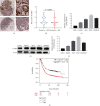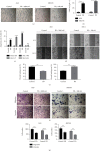Expression of CDK6 in Stomach Cancer and the Effect of CDK4/6 Inhibitor PD-0332991 on the Function of Stomach Cancer Cells
- PMID: 35535229
- PMCID: PMC9078806
- DOI: 10.1155/2022/2402567
Expression of CDK6 in Stomach Cancer and the Effect of CDK4/6 Inhibitor PD-0332991 on the Function of Stomach Cancer Cells
Retraction in
-
Retracted: Expression of CDK6 in Stomach Cancer and the Effect of CDK4/6 Inhibitor PD-0332991 on the Function of Stomach Cancer Cells.Comput Math Methods Med. 2023 Jun 28;2023:9807835. doi: 10.1155/2023/9807835. eCollection 2023. Comput Math Methods Med. 2023. PMID: 37416266 Free PMC article.
Abstract
Objective: To study the expression and prognostic value of CDK6 in stomach cancer and the function of CDK4/6 inhibitor PD-0332991 on the proliferation of stomach cancer cells.
Methods: Immunohistochemistry was used to detect the expression of CDK6 in stomach cancer tissues and adjacent normal tissues and to analyze the effect of CDK6 on clinicopathological parameters of stomach cancer patients. Kaplan-Meier plotter was employed to study the relationship between CDK6 and overall survival in stomach cancer. Western blot and RT-PCR were used to detect protein and gene expression of CDK6 in different cells. The effects of CDK4/6 inhibitor PD-0332991 on apoptosis and aging of stomach cancer cells were detected by flow cytometry and β-galactosidase aging staining assay. The effects of CDK4/6 inhibitor PD-0332991 on the invasion and migration of stomach cancer cells were explored by the wound healing experiment and the Transwell experiment. The supernatant of stomach cancer cells was collected, and the effect of CDK4/6 inhibitor PD-0332991 on tumor markers of stomach cancer cells was detected by biochemical immunoassay.
Results: (1) CDK6 was highly expressed in stomach cancer tissues and cells. (2) Abnormally elevated CDK6 expression results in shorter survival in stomach cancer patients. (3) CDK4/6 inhibitor PD-0332991 could block the proliferation of stomach cancer cells, but not stomach epithelial proliferation. PD-0332991 could inhibit the secretion of pro-GRP by MGC 823. (4) PD-0332991 could advance the development of the apoptosis and senescence of stomach cancer cells and suppressed the invasion and migration of stomach cancer cells.
Conclusion: CDK6 expression is elevated in gastric cancer, and the CDK4/6 inhibitor PD-0332991 can remarkably promote apoptosis and senescence of stomach cancer cells and effectively inhibit the migration and invasion of stomach cancer cells.
Copyright © 2022 Yu Liu et al.
Conflict of interest statement
The authors declare that there are no conflicts of interest regarding the publication of this paper.
Figures



References
Publication types
MeSH terms
Substances
LinkOut - more resources
Full Text Sources
Medical

